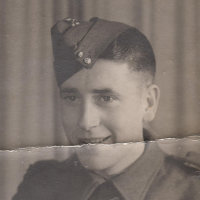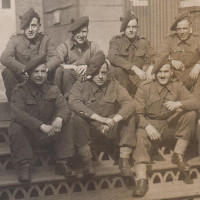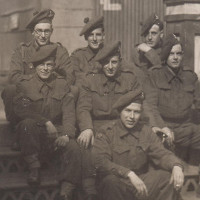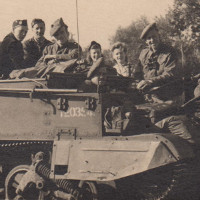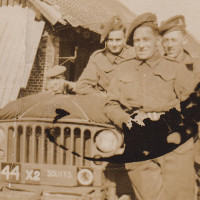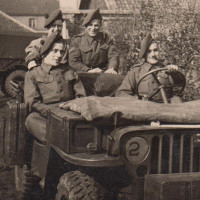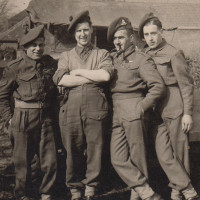Harold Bradley
My Small Part In Hitler's Downfall
Forgive the heading but I think Spike Milligan would have approved, had he been able to.
There is one further comment I would like to make, my achievements could well have gone largely unnoticed had I not been supported by 319 Bty - 131 Fld. Regt. 15th. Scottish Division.
My name is Harold Bradley (known as Brad) and I have been persuaded to write down some of my wartime experiences, while I am still able to do so, hope you agree.
However before I go along that path, I think I should give you some information of my background. I am now 88 years old, born 9th. June, 1923, into a large family in Acocks Green, on the edge of Birmingham. I had five sisters and two older brothers, my parents were strict but fair and I had a happy childhood.
However, 1923 soon became 1939 and we were at war with Germany. My two older brothers joined the forces fairly quickly, my eldest brother Frank joined the Grenadier Guards and Bill joined the RAF Air Sea Rescue because he was quite good with engines.
As for me, my parents prevented me from joining up until I was 18, that meant I was able to join the forces with or without their permission. On the 28th August, 1941 I swore true allegiance to King George the 6th. And I was now in the army and posted to the Royal Welsh Fusilliers, No. 21 infantry training center Brecon, Wales.
We were trained very well and had about 10/12 weeks to get ourselves together, we thought we were good which is the foundation of a good unit.
We were then transferred to the Battilion R.W.F. because we were all 18 to 21 years old, very fit and volunteers. We were chosen for special training, I was chosen to be a signaler, Morse code-telephones, radio etc. It was at this point that they obviously thought we looked good enough like soldiers to be allowed home for 9 days.
On our return training continued and the routine of army life became acceptable, so I will tell you of an incident that I fondly remember. On Sunday morning we were marched to church, on this particular Sunday, which was a very Welsh Sunday, the rain was persisting down and had been for some time. We were being inspected by our company commander who now makes his way back to his podium. He then lets fly, we were the most disgusting *** how dare we wear the uniform of a proud regiment etc. the climax of his announcements were "there was only one clean b*****d on the parade ground and that was the f****** goat (our regimental mascot).
My training continued much the same way, with occasional leave until September 1942, when we were told that the 70th. Battalions were to be disbanded and a new R.W.F. Parachute Battalion was set up, where most people went. However about a dozen of us, all signalers were being posted to Royal Artillery.
Goodbye R.W.F. - Hello R.A.
According to my army records on the 15th. September, 1942, I was transferred to the Royal Artillery, 131 Field Regiment, 319 Battery, who were stationed at Broom Park, Northumberland, just north of Alnwick. This I thought was a very beautiful part of England, but alas we were not there to admire it, but to use this enormous space as an artillery range. The guns we had in 319 Battery were known as 25 pounders, in my opinion, there were two guns that dominated the war, one was the German 88mm", anti tank gun, the other the British 25 pounder. Each very different from the other, but truly master of its class.
I think at this point it may help if I offer some information on the structure and role of the artillery in a wartime situation. A Battery consists of 8 - 25 pounder guns which are split into two groups each with 4 guns. As 319 Battery is the senior Battery in 131 Field Regiment, the troops are designated as "A" and "B" troop, however as our regiment 131 has three Batteries, we now have 6 troops and 24 guns. Each gun can fire a 25 pounder shell up to approximately 7 1/2 miles with super charge, at the rate of 10/12 shells per minute for a short spell, with a first class crew (the Germans thought they were belt fed). Now add to that, the greatest accolade bestowed on a 25 pounder, was for accuracy. How do we know where to fire? Your first information comes from your observation post or O.P. which means you can have up to 3 - O.Ps within each Battery. A Troop Commander - B. Troop and Battery Commander. The O.P. is normally with the unit that is in the most forward position, be it infantry, armour or reconnaissance. Having decided you need the guns, the at O.P. will inform his signaller of the map reference where he wants the shells to fall. The ranging process is normally done with one gun only, corrections are made for line and distance as needed. You are now able to decide how many guns and how many rounds are required according to need. All communications between O.P. and guns are via radio. Here endeth the first lesson.
Life as a Gunner
Having got to Broorn Park there are now only 3-4 fusiliers in 319 Battery, the rest are dispursed within the other two Batteries. We will, of course, still operate as signaller, but there were changes. The R.A. read morse code a little faster, it was now 12 words a minute. Some of us went further and were able to read morse at 18 words a minute. This allowed us to communicate with H.Q. where signals were dealt with by the "Royal Corps of Signals". However we were no longer required to signal with lamps or semaphore. The other change was we no longer had to carry our radio sets, far too large. I, therefore now had to learn to drive.
On a lighter note, you can imagine after a few weeks at Broom Park, we ex fusiliers were feeling like fish out of water, when we were told we were going to be visited by a Brigadier General. This, of course, caused a great deal of consternation and the resurrection of that ancient army motto "if it moves, salute it - if it does not move, paint it". In general there is a lot of cleaning, polishing and parading, in order to create the right impression. It is in this air of unease that three of the ex fusiliers are told to report to the office, where we learn that, on the day of the Generals visit, we three will be on guard duty in order to "Present Arms" on his arrival and departure. The General liked it and so did we.
A Nissan Hut in Broom Park.
This is where you learn to make friends of your enemies and enemies of your friends. This is where sitting on your bed attempting to darn socks "doth make cowards of us all". It's very democratic, if you are wrong, you have 20 voices to tell you. But it is also where you build memories that you can recall nearly 70 years later. Here are a few reminiscences.
Bougard (Bougie)
We never shared a hut but we did share a strong bonding, I was never in doubt about his friendship. He was an ex fusilier, we joined 319 together. He loved doing the unexpected, I have learned through his grandson (Aaron) that he carried responsibilities I did not have. He, therefore, remained a little isolated.
In 2009 I thought about him a great deal. As he came from Guernsey, I go for a holiday. I enlisted the help of the local paper, I was now faced with a problem, I did not know how to spell his name, having heard it a thousand times on parade. It appears three times in the local paper, no result. Whilst staying at the hotel Michel, one of the guests said to me, when you go home get on the computer and do not give up. That led me to 131 and Aaron's piece about his grandfather. Just after we landed in Normandy, we are on a farm, he came to me and said "there are some chickens about here", come with me. We enter into a large barn to the sound of chickens. Bougie has picked one up. Now we hear the voice of the farmer, we take up a position, standing close to a large farm cart, the farmer approaches from the other side. Bougie engages him in conversation, the farmer leaves from his side of the cart, we leave ours, I say "I thought the chicken would make a noise", "he can't Brad, he is dead".
Tommy Laird.
This is a man I became very fond of, Tommy was considerably older than me, he was our motor mechanic, lived in an adjoining but, always pleasant and helpful but I got to know him better after we landed in Normandy. During quieter moments, I found myself talking to him on many occasions on many subjects, he often fascinated me when he talked about the sky. But there was a lot more to him than that, he was quite nutty. One game started when I came back to H.Q. and wanted to get the vehicle under cover. Tommy encouraged me to come forward until I had him trapped against the wall behind him, this became a game, another was, if I was carrying a revolver I had to prepare for him by taking the first cartridge out of the chamber, so that I could draw and pull the trigger, he was a man I remember with great affection.
Roy Grigg.
A driver in the army and a policeman at home, which was Cornwall. Many years ago my late wife and I booked a cottage in a small village for 2 weeks holiday. When we got there my wife reminded me that I often spoke of Roy, was I going to try and find him? In such a small village where do I start? Then I learned there was a young policeman within the village. I had to answer a great many questions to try to ensure my intentions were honorable, he then picked up the phone and said "Roy, does the name Harold Bradley mean anything to you. No, how about Brad?". He was about 60 yards away from me. But I remember him best for his voice, he was a well trained tenor and a very good friend. I also have an endearing picture in my head of Roy on June, 9th. 1944 when we were in the South of England. We had heard the news about the D Day landings, we were packed and on standby. Roy and I were in an empty bell tent apart from the box he was sitting on, he lit his pipe and all seemed well with the world, he and his pipe had the effect, I said to him "It's my 21st. birthday today" he said "it seems like a good day to have it". That afternoon we were in Normandy.
Joe Wilson
This is the man who was my closest friend during my time in R.A. and yet I cannot think of an incident of interest, rather like being married, you cannot think of anything nice to say about your wife. I remember Joe came to see me sometime after the war. You have to keep in mind that when I was captured about the 14th April, 1945, I did not see Joe again until he visited me at home. He was visiting Birmingham, I remember we went to my local fish and chip shop, which was rather posh, they had dining tables. We then went to the pub about 50 yards away, a couple of pints and he had to leave. If you are out there Wilson, speak up.
George Heard.
This man was like an older brother to me, he was 7 years older, very much larger and used to tease me a great deal. He came from Devon and was a policeman like Roy Grigg, in fact they were good friends. He was into wrestling, he used to throw me around our hut and then sit on me, all 15 stone of him, I would always tell him what a cruel illegitimate person he was. However he did come in useful on one occasion when we were trying to waterproof our vehicle ready for the invasion. Having followed the army manual to the letter, we went to the nearest river, the local farmer gave us his permission to use his access to the river but also strongly advised us not to try to cross, the river was too fast to try to cross on that day (foolish man)
We were all set to drive this 15 cwt. across, I was asked to drive and George was to accompany me (thought his weight might be useful). We have reached the center and are picked up by the river and dumped in a much deeper area, water got into the exhaust, engine stopped. George says "Brad, one of us has to swim to the bank, tie a rope around his waist and come back again, which one of us is going?" I said "George, I can't swim". "Can't swim", I won't tell you what he said. Fortunately he was a very good swimmer. He behaved like a good and proper policeman and saved me.. There had to come a day when he was useful.
The Rhine
When we boast of danger we usually mean someone else has died. This maybe is something you carry around for the rest of your life. I don't mean you should have a sad life there after, I have in the main had a long and happy life, perhaps even more so because of what might have been. But let us remember other people's sadness.
Some of you 131 Regiment followers will already be aware that during the crossing of the Rhine, Major Oliver and three signallers died, it was said that they were cut down, together with many infantry by a German machine gun. I expected to be one of those signallers.
As I recall, the Brits were spread several miles along the river. We had been in this position for 3-4 days, going down the river edge, carrying out various tasks that would facilitate our crossing. These activities were carried out each day for several hours. However, when we were at the riverside the artillery put down a heavy smoke screen on the German side. Our theory being, the Germans knew we were coming, but they don't know where and they don't know when. On our last evening of preparation Major Oliver was alongside me and said "you are not coming with us tomorrow, I want you to stay with our vehicle, it has everything in it that we need to do our job and join us as soon as possible. You will have to wait for a bridge". I presumed, therefore, that Bdr. Andy Steel and Bennet would be with him on crossing. We learned later that Major Oliver and three signallers were all killed. It was sometime later that I learned their names. It was only then that I realized that he had three different signallers for the crossing. I presume Andy Steel and Bennet must have departed on leave, we three were all due leave.
After the river crossing it was a race to get as far into Germany as possible, the column often went straight through small towns and villages, with sporadic firing as you passed through, a bit like a western. This continued on and off until April, 14th. Our half track traveling with the Guards Armoured Division came to a halt, one of those dreadful German 88mm. Captain Clark got out and asked me to sit in the front and man the radio from there. Life got very noisy from here on, a German multi-barrelled 20mm SP gun moved in on my right accompanied by his friend with a light machine gun (mauser, I think) they both sprayed our column. With hindsight you realize what a wonderful tactic this was, stop the advance and then hit it with everything you have from the sides.
I soon realized our half track was on fire, burning petrol is running all around me. I climbed out through the top, I can see a shallow ditch runs along the sides of the road, already well occupied. As I am clambering down from the front of the vehicle and looking around I remember quite clearly saying to myself "well Father, I have often wondered how I would react in a really tight spot, I think this is it". By now I am near to the roadside ditch and push in between two chaps who are already there. The SP gun is now in front of me and the guy with the machine gun to my right. He sprays it along the ditch and the SP is pouring 20mm shells along the column of vehicles. I can watch the shells going through our half track like cardboard and bouncing off our brengun carrier in front of us. The firing ceased, the Germans rounded up anyone who could move, which was not many, people both sides of me did not move. I managed to have a few quick words with Sgt. Alf Branden who was in the rear of our half track and badly burned. We were quickly moved on and off to a P.O.W. camp
P.O.W.
Having been taken prisoner we were marched off at a good pace in the direction of Schwerin 'remember the German army is on the run'. My memory of getting there is almost blank. You have to keep in mind that almost all people taken P.O.W. go through a gigantic phase of shock. We are all well aware that we may be injured or killed, being captured almost never enters your mind. I do recall going through the town of Schwerin, we passed a bus stop where a few people were waiting, there was a young teenager in a nice uniform (Hitler youth movement I presume) who spat on us as we passed. Remember this is about three weeks before the end of the war. It gives a good indication as to the depth of their indoctrination to the cause. We finally arrived at the P.O.W. camp 'Stalag 2e Schwerin' where we were met by S.S. Officers. There was a short interrogation, our pockets turned out etc. I had some snapshots on me which had recently been taken. These were stamped on the back and returned. This process became quite tense, fortunately for us some of the inmates moved among us, asking normal questions, but also constantly uttering soothing words like "steady", "take it easy", "keep calm", because the S.S. were doing what they were good at, trying to provoke us. However it all went off without incident and we were moved on to another area.
We were about 50 yards from what looked like an officers mess. When we stopped we soon had girls running out to try and get the latest information on the war. Our difficulty for the moment was trying to understand them. However help was at hand, we were joined by a man in a different uniform, not German, who was their interpreter, he was about to be put to the test. It's impossible to say from this distance but I think he must have spoken at least 6 different languages, it was very impressive. He explained that the girls were from various parts of Europe, they waited on the German officers.
Then we were moved on again, I can't recall how, and ended up in a small village named Rastow, which was going to be our home until we were released. The place where we were billeted, had been a brick manufacturing sight. No barbed wire, in a quiet part of the country. The part we occupied I think would have been the area for the storage of bricks. Apart from the ground floor there was a second floor about 10 feet wide all around the edge of the building, where we slept on straw, which was infested with many tiny creatures.
I think there must have been about 100 prisoners already there, most of them belonged to the Welsh Guards who had been captured at Dunkirk. These are some of the people who formed the line of defense that enabled the evacuation of the beeches to take place. Apparently when they took up position in France they were told "sorry lads we don't move from here" and here they were, extremely happy because we were able to confirm the war was nearly over.
When we got down to the nitty-gritty they informed us that they operated in small groups of 4 to 6 which improved chances of survival and suggested we split up into ones or twos at the most and join their small groups, because there was a desperate shortage of food, which applied equally to the Germans. In fact we had an advantage they did not share, we got a Red Cross parcel roughly every week, I am sorry I cannot list what was in it. However, I do remember it usually contained food, soap and cigarettes,which were highly desired in this deprived world. The food, of course, we ate, cigarettes and soap could be bartered.
However, bartering could only be achieved with the cooperation of the Germans. This could only be done by getting outside the camp. One way we had of doing this was to volunteer for work outside the camp. This usually involved tidying up after the R.A.F., they really were very untidy people.
On one occasion we were helping to repair the railway line, which had been bombed and machine gunned. Whilst working a train was heard coming along, we then realized we have three R.A.F. typhoons above us. The train seems to be struggling, well loaded I presume. The driver would appear to be aware of the R.A.F. and puts his engine under cover using a near by road bridge. This stand off continues for a while, he then decides to make a run for it. The typhoons swoop down, I don't remember any more. With hindsight we know the train was carrying ammunition, where we were working the railway had 2 wood either side of the line, the wood had disappeared both sides. There was one strange aspect of it, I found that the trunks of the trees were all severed off at about 4 to 5 feet high.
My next memory is very vague, I have images in my mind of attending a burial service with a difference. We were burying Brits and Germans at the same service, which with hindsight pleases me because the guards were very reasonable to us, with good reason I know.
The next thing I remember we had the Americans with us who offered us their firearms to sort out any of the guards, we did manage to convince them that executions were not necessary. They settled down to asking questions, one of which was "are you guys hungry" and that was the end of hunger. We now had a new problem, we could eat very little. For example one of our little group came and presented us with a large crate of eggs, at least a hundred. We were each going to eat about a dozen. We boiled some in a can and then started shelling, I think the most anyone could eat was three.
About two days later the front line troops moved on, we now had what you could call administrators who wanted to question the locals, not many of them spoke German, it was then made known that there were about a hundred prisoners who, after five years, have acquired a good deal of the language. They then paired one American, one prisoner, the prisoners now became the inquisitors.
After the official ending of the war the wheels where put into motion to get us home, those with the greatest need go first. I think we came home via about three transit camps, on each occasion we had to strip and go through a delousing process. The best Part was the shower afterwards. We finally got to England and a further transit camp but after showering we were issued with new uniforms and personal kit, we were at last going home. It was about this time when, on parade, we were asked, how many of you have a phone at home, would we fall out. I was then told I had about two minutes. My mother answered and she hears "Hello Mum". I, of course, did not realize she had received a telegram saying "missing believed killed", how I have wished again and again I had talked to her about that moment. I had three months at home, on return to the army, I was not allowed to rejoin 131 due to ruling on high, the best part was being in Greece for about six months. The Greeks had financial problems then (1946) and the rate of exchange was very much in our favour, I was almost rich, I enjoyed swimming in the afternoon, football after dinner. Demobbed late 1946, married December 1946 , and this is where I close the doors.
Acknowledgements
To my daughter Barbara for providing me with four grandchildren, Samantha, Jon and Matt (Twins) and Dan followed by Eleanor and Charlie, great grandchildren. All whom have urged me to get on with this. I would like to ad my special thanks to Barbara for preserving the photographs which I neglected long ago, without her intervention they would have been lost.
To my sisters, Joan and Joyce and also nieces and nephews, Rod and Annett, Valerie and Martin, Ian and Paul. I hope you enjoy this.
Edward Seymour. Whom I thank for setting up 131 web site. He convinced me that there was a need for people such as myself to speak out and provide a link with the younger generation.
